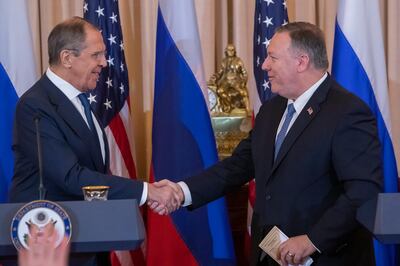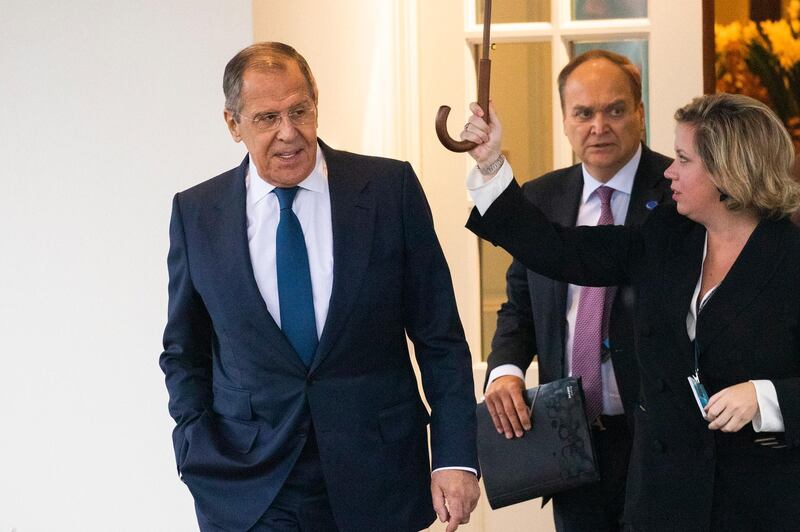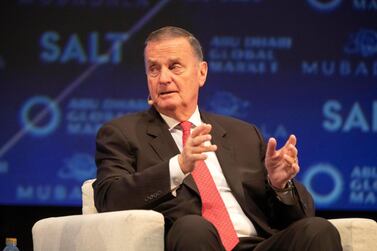Russian Foreign Minister Sergey Lavrov received a warm reception on his official visit to Washington on Tuesday, having an unusual meeting in the Oval Office with US President Donald Trump.
The meeting was held as the US House of Representatives pressed impeachment articles.
Following the meeting with Mr Trump, the White House issued a readout saying that the US President "warned [Lavrov] against any Russian attempts to interfere in United States elections and urged Russia to resolve the conflict with Ukraine". On the Middle East, "he urged Russia to support United States efforts to prevent Iran from developing nuclear weapons".
But Mr Lavrov, speaking to reporters at the Russian embassy in Washington, said: “No, we haven't even discussed elections.”
He later clarified that he told Mr Trump about his discussions of election interference in the meeting with Mr Pompeo.
White House says “President Trump warned against any Russian attempts to interfere in United States elections”
— Julian Borger (@julianborger) December 10, 2019
In meeting with Lavrov. Lavrov just now: “No, we haven't even discussed elections.”
It was two and a half years since the last controversial meeting between Mr Trump and Mr Lavrov in the White House, after which the US president fired FBI director James Comey.
Before the presidential welcome, the foreign minister held a nearly three-hour meeting with US Secretary of State Mike Pompeo.
Mr Pompeo, speaking alongside Mr Lavrov, described US-Russia relations as “complicated”.
He said their discussions included Ukraine, Venezuela, Syria, North Korea, the strategic nuclear arms limitations treaty between the US and Russia, known as Start, and election meddling.
No breakthroughs were announced on any of these issues.
Mr Pompeo stressed US commitment to the UN Security Council resolution calling for a political settlement in Syria, and making sure the country was not a haven for terrorism.
But the two clashed when Mr Pompeo warned Russia against meddling in US elections.
“I was clear it is unacceptable and I made our expectations of Russia clear,” he said.

Mr Lavrov responded: “All speculation about our alleged interference in domestic processes of the United States is baseless.”
“No one has given us this proof because it simply does not exist."
Mr Pompeo shot back: "We think we've shared plenty of facts to show what happened in the 2016 election with our Russian counterparts.
“We don't think there is any mistake about what really transpired there.”
The fate of the nuclear arms treaty, set to expire in February 2021, was expected to be discussed at the White House.
“We’re absolutely expected to talk about arms control but also election security, for example, and national security,” White House spokesman Hogan Gidley told Fox News.
A former senior US official expressed fear that Mr Trump would undermine his administration’s efforts to pressure Russia.
"Even when career diplomats tell him to stick to a policy, in lot of instances he doesn't," the former official, who dealt with Russian affairs, told The National.
The Ukraine debate, in which Mr Trump is accused of withholding military aid for his own gain and which is the subject of impeachment inquiries, is one example given by the official.
He said Mr Trump listened to his friend and lawyer Rudy Giuliani rather than heed the advice of US officials.
Andrew Weiss, of the Carnegie Endowment for International Peace, tweeted that there was “zero indication of what Mr Trump hopes to achieve from the meeting. No one at the White House or State Department can say no to this President”.
There's been zero indication of what Trump hope to achieve from the meeting (after all, the bilateral agenda is completely barren). The Russian agenda is totally transparent , but no one at the White House or State Dept can say "no" to this President. 2/ pic.twitter.com/e0ZFmcwV5d
— Andrew S. Weiss (@andrewsweiss) December 10, 2019
Mr Weiss said that after the departure of former national security adviser John Bolton and former US ambassador to Russia Jon Huntsman, the foreign policy team “no longer has a point-person on Russia policy”.
Chris Miller, the Director of the Eurasia Programme at the Foreign Policy Research Institute, said there was not much room for progress in Mr Lavrov's meeting other than discussing a new nuclear treaty.
Mr Miller said that would bring its own challenges. The White House idea of China joining a three-way treaty is confused by the fact that China has a far smaller nuclear arsenal.
A second challenge is the timeline, he said.
"It is clear that there is close to zero chance of one being concluded before Start expires."
Mr Miller said that there was also little room for the president's overtures.
"Mr Trump clearly wants to befriend the Russians, which is why he is willing to incur domestic political criticism for the meeting," he said.
"But the White House has no idea what to discuss with the Russian side. So they hold empty photo ops instead."








